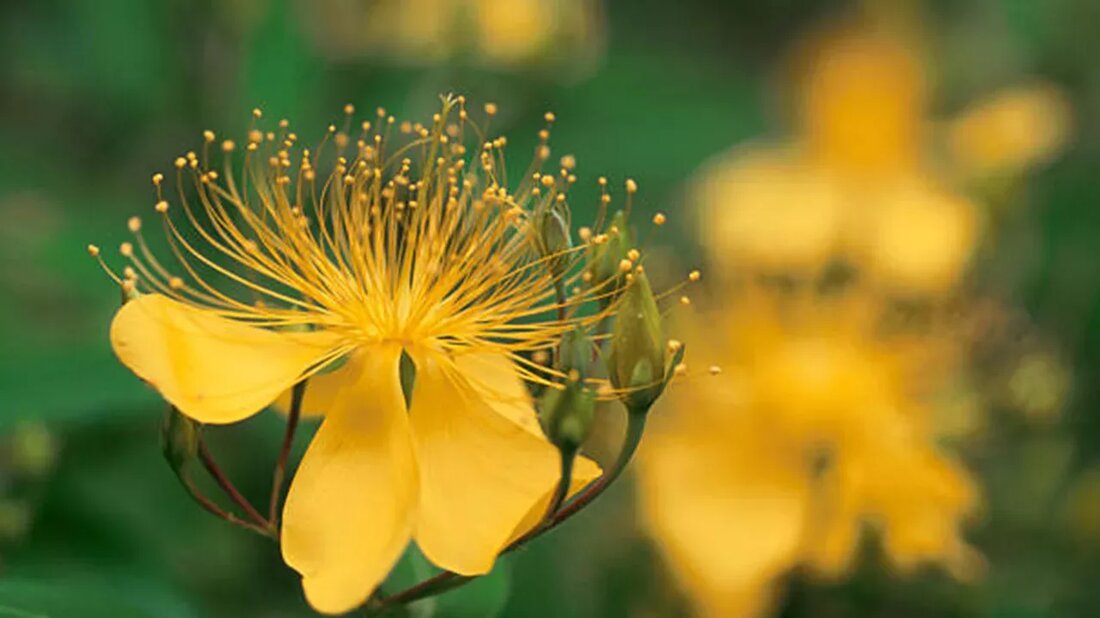St. John's Wort and its benefits - Natural support for mental well-being
A healthy, organic diet and regular exercise are crucial to laying the foundation for a healthy life. Herbs such as St. John's Wort (Hypericum perforatum) are a source of antioxidants and other special nutrients that promote physical and mental well-being. In fact, people have turned to St. John's Wort as a natural remedy for a variety of health problems for centuries. Let's take a closer look at the history and benefits. ((Link removed)) St. John's Wort Quick Facts Scientific Name: Hypericum perforatum Family: Hypericaceae Origin: Europe and Asia Plant Type: Flowering, Perennial Health Benefits: Supports mental well-being, women's health and healthy skin History of St. John's Wort Due to the ability of...

St. John's Wort and its benefits - Natural support for mental well-being
A healthy, organic diet and regular exercise are crucial to laying the foundation for a healthy life. Herbs such as St. John's wort ( Hypericum perforatum ) are a source of antioxidants and other special nutrients that promote physical and mental well-being. In fact, people have turned to St. John's Wort as a natural remedy for a variety of health problems for centuries. Let's take a closer look at the history and benefits. ((link removed))
| St. John's wort letter information | |
|---|---|
| Scientific name: | Hypericum perforatum |
| Family: | Hypericaceae |
| Origin: | Europe and Asia |
| Plant type: | Flowering, perennial |
| Health Benefits: | Supports mental well-being, women's health and healthy skin |
History of St. John's Wort
Because of St. John's Wort's ability to promote a pleasant mood, much of its history involves superstition and ghosts. Traditional Greek use was to hang the plant over religious paintings and statues to ward off “evil spirits.” Greek herbalists saw other uses for the plant and made tinctures to help with cuts, burns, harmful organisms and even snake bites. ((link removed))
The mystique surrounding St. John's wort carried over to early American settlements, where the plant was often sewn into door wreaths to drive away unfriendly spirits. Settlers also believed that the herb would trigger a confession if placed in the mouth of a suspected witch. Today, most of the superstition that surrounded the plant has long been forgotten, and it is believed that the plant's ability to influence mood and temperament is due to its nutritional components. (Source)
St. John's wort and depression
St. John's wort has shown promise in relieving symptoms of depression. Depression can present itself in many different ways and is often described as a persistent feeling of extreme unhappiness. If you ignore these symptoms, it can affect sleep, appetite, energy, cognitive function and even the immune system. Prolonged or severe depression is typically due to a chemical imbalance in the brain.
Selective serotonin reuptake inhibitors (SSRIs) are one of the most commonly prescribed antidepressants. They target serotonin, an important neurotransmitter that influences mood. SSRIs increase serotonin levels by blocking serotonin reabsorption in neurons. Theoretically, this can increase the amount of serotonin available in the brain and improve the transmission of messages between nerve cells. Unlike SSRIs, St. John's Wort inhibits the reuptake or reabsorption of all neurotransmitters, including monoamines, dopamine, and norepinephrine, as well as the amino acid neurotransmitters GABA and glutamate, making them more available. ((link removed))
Nearly 30 international studies report that St. John's wort works better than placebo in patients with mild to moderate depression. However, other studies have found it to be less effective in treating more severe types of depression. Many doctors in Europe recommend St. John's Wort to patients with mild to moderate depression, and it is also a popular natural remedy for the blues in North America. ((link removed))
St. John's wort and PMS
Common symptoms of PMS include headaches, bloating and fatigue. Women who experience more severe symptoms may have premenstrual dysphoric disorder (PMDD). Symptoms of PMDD include depression, mood swings, and anxiety. A double-blind, placebo-controlled study found that St. John's Wort positively influenced the physical and behavioral symptoms associated with PMS. More serious symptoms such as anxiety, depression, aggression, and impulsivity remained unchanged after St. John's wort supplementation. Further research should shed light on whether long-term supplementation is useful for PMS or PMDD symptoms. (Source 1, (link removed))
St. John's wort and menopause
Menopause is associated with a natural decrease in reproductive hormones in women aged 48 to 55. The symptoms of menopause include hot flashes, sleep disturbances, mood swings, and reduced sex drive. St. John's wort may help treat some of these symptoms. Women reported a decrease in the intensity, frequency, and duration of hot flashes after taking St. John's wort extract daily for eight weeks. Another group of women aged 43 to 65 reported improvements in sexual well-being after taking St. John's wort extract. ((Link removed), (Link removed))
Other benefits of St. John's wort
St. John's wort has been studied for anxiety, stress, seasonal affective disorder (SAD), and obsessive-compulsive disorder (OCD). The antioxidant properties in St. John's wort alone could make it an effective neuroprotective agent. ((link removed))
Over the course of a month, St. John's wort promoted wound healing in intensive care patients. The plant's calming effects and resistance to harmful organisms is a possible explanation for its ability to promote healthy skin. ((Link removed), (Link removed))
St. John's wort supplements and tea
You can find St. John's wort in a variety of forms, including pills, powders, and liquids. While carefully measured extracts ensure effectiveness, you can also make tea with the plant's fresh flowers. St. John's wort tea is easy to prepare; Simply dip a handful of flowers into hot water for four minutes and let them steep.
St. John's Wort Side Effects and Precautions
St. John's Wort may interact with prescription medications; It can reduce the effectiveness of birth control pills, heart medications, and even some HIV and cancer medications. Side effects are rare but do occur. These include dry mouth, upset stomach, increased sensitivity to light and increased feelings of anxiety. As with any supplement, use by pregnant or breastfeeding women and children is not recommended without clear direction from your personal, trusted health advisor. ((link removed))
Alternative approaches to mental health
There are many natural alternatives to support mental wellness. Nutritional approaches to mental health can have a big impact on how you look and feel.
Consuming the right food that is whole, organic and nutritious supports a positive state of mind. Daily exercises such as yoga or walking are extremely effective in promoting physical and mental health. No matter your physical condition, adequate sleep and daily meditation can work wonders to ease anxiety, improve mood, and clear the mind. ((link removed), source 2)

 Suche
Suche
 Mein Konto
Mein Konto
